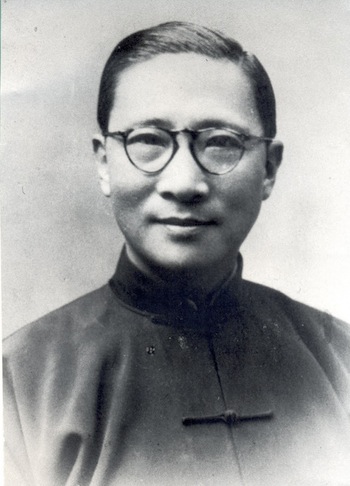|
|||||||||||
|
FEATURESOn the Chinese ConstitutionA Chinese Constitution For The ChineseThe China Critic
This Editorial appeared in The China Critic, VI:44 (2 November 1933): 1072-1073. The text of the Draft Constitution discussed here may be found in The China Critic, VI: 34, 35 and 36.—The Editor
Related ArticlesConstitutional Developments in China, by H.H. Sun 孙浩炫 Pertinent Views on the Latest Constitution, by Lin Yu 林幽 International Tendencies in the Draft Constitution, by Yuen-li Liang 梁鋆立 In this issue The Critic publishes three special articles on Dr John C.H. Wu's [吳經熊, 1899-1986—Ed.] draft constitution which was released some four months ago for general study and criticism and which is at this moment being revised in deference to candid public opinion. Within the restricted scope of the three articles we attempt to present the history of constitutional developments in China, the international tendencies of her foreign policy, and the pertinent views on the constitution under review.  Fig.1 'The Sad Plight of Chinese Law', in 'Week's Best Chinese Cartoons', The China Critic, 18 September 1930. The most gratifying feature which has greeted us in our present study, however, lies outside of the subject itself. The abundance of literature which has flooded the Chinese press since the first appearance of the Draft Constitution is most agreeably overwhelming. It may be safely asserted that there is no single Chinese periodical of note that has not devoted generously of its columns to an intelligent examination of our future bill of rights. The widespread interest thus manifested is a healthy sign of the growth of a national political mind. This is a condition precedent to a full exercise of political rights by the people and to the termination of what the Kuomintang has been pleased to call the period of political tutelage. The old axiom still holds good as ever that a nation deserves as much of its ruler as it proves itself deserving. Before a constitution can be made effective as an instrument of guarantee, its beneficiaries must of necessity understand what it is and what it implies. A nation cannot be governed constitutionally until and unless it can think constitutionally. There would have been no constitution for America, for France or for Germany, had there been no constitutional-mindedness on the part of their nationals. The response which Dr Wu's draft has brought forth cannot but be accepted as auguring a new era of political thought in China which alike challenges the government and stimulates the governed. In a broad sense the submission of the draft to public criticism is in itself a test of public claim to constitutional rights. If the proposed constitution were received with perfunctory comments and cursory interest, it may be judiciously concluded that the nation is neither prepared for nor worthy of any constitution at all. The extensive and intensive commentaries which we have witnessed in the press should go a long way toward proving that the Chinese are both interested in having a constitution and qualified to have it. The public is thus indebted to Dr Wu for providing, wittingly or otherwise, a venue for expressing its studied opinions on a subject which directly bears upon its well-being.  Fig.2 John C.H. Wu (吳經熊, 1899-1986), Managing Editor of T'ien Hsia and regular contributor to The China Critic, who formulated the draft constitution discussed in this section. General appreciation, however, does not necessarily signify general endorsement; in fact, appreciation is most genuine when it is most critical. Dr Wu and his associates will hardly be perturbed by the voluminous adverse criticisms showered upon them and may conceivably take particular delight in watching the critics wrangle, pro and con, over the fruit of their ardent labors. In studying the Draft the essential point to be borne in mind is its status as a draft. There is no finality to its text, and there is no pretense to its perfection or near-perfection. The process of revision which is now proceeding may alter it so materially as to submerge its present identity. So it would suffice here to deal only with the fundamental principles underlying its conception. No matter what the ultimate constitution may be, we may register at the outset that it will be based upon Dr Sun Yat-sen's San Min Chu I or the Tree Peoples' Principles. Critics are apt to deprecate their introduction as lacking in precedent. This may be true in form, but in spirit ample justification is provided in the constitutions of Soviet Russia, Germany and other lesser states, in which the political tenets of each party in power are incorporated. The San Min Chu I, furthermore, is not an exclusive legacy of the Kuomintang. It is more than a party platform; it is a political doctrine to which the Chinese, with or without party affiliations, can hardly object. The Kuomintang may recede into the background in the China of tomorrow, but the Three People's Principles will guide, in one way or another, her constitutional evolution under other political organisms. They will, in other words, survive any single party, which reigns today or may reign in the future. Their embodiment in the draft, when viewed in this light, need occasion no concern over its inelasticity or inflexibility. A constitution is a recorded and a forerunner of political tendencies of an age. It reflects the political wisdom of the past and lights the political path ahead. It is not, contrary to popular conceptions, and instrument which becomes venerable only in time. If the spirit of 'equality, fraternity, liberty' may permeate the French Constitution, or if the creed of independence and individual freedom may characterize the American Constitution, then there is no reason why the San Min Chu I may not be the basis of China's Constitution. For the provision for 'the People's Livelihood' Dr Wu's draft is also not wanting in precedent. In the German Constitution one may note even more definite and thorough protection to labor, for 'every German shall have the opportunity to earn his living by economic labor', and 'so long as suitable employment cannot be procured for him, his maintenance will be provided for.' Neither need Dr Wu apologize for injecting moral cardinals into his draft. Some may contend that the reverence for parents calls for no constitutional encouragement, but if we were to be frank with ourselves. The spirit which has held the family system intact and thereby the nation together is in danger of fast extinction. China for four thousand years has been a great nation because of her traditional virtues of which filial piety stands out preeminent and the disregard of which has been largely responsible for the moral disintegration of this generation. If Prohibition were worthy of a constitutional amendment in America, shall we hesitate to grant an equal importance to the respect for parents which is the fountain of all human relationships? While we have endeavored to examine certain parts of Dr Wu's draft in the light of precedents, we are far from the belief that it need be patterned after any other constitution at all. Only too often are we prone to emulate the examples set by the occident, and only too readily have we ignored the special conditions in our country which demand special treatment. A constitution which is to govern China must be a Chinese Constitution. It may resemble that of another country, and yet it may not. The sole test is its serviceability to China, and China alone. Incapable of meeting this test, even the best compilation from the best constitutions of the world will be worthless indeed. |